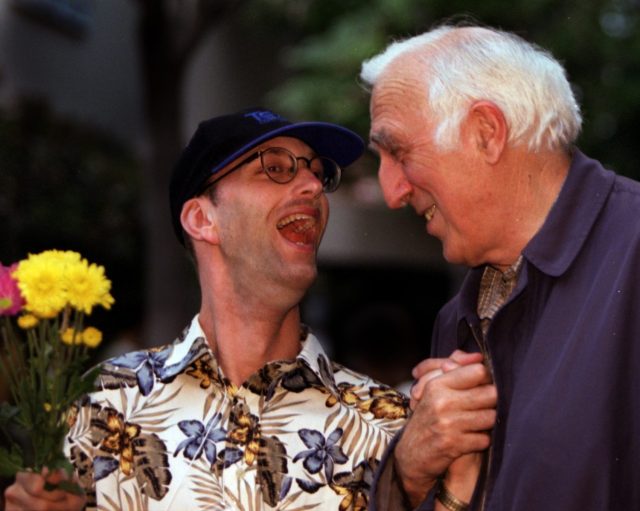Jean Vanier, right, with Mark Drangstveit . Credit: Glenn Koenig / Los Angeles Times via Getty

A short while ago, news websites were full of pictures of the Met Gala in New York. Celebrities paraded around wearing all kinds of outlandish outfits. It was an exhibition of showy, A-list glitz at its loudest: illustrious people, many famous for not much more than being famous, tailgated by swarms of photographers there to record the occasion. It was the epitome of our celebrity ‘look at me’ culture.
A day later in Paris, Jean Vanier died. He was no celebrity and held no high public office, yet the tributes paid since his death give a flavour of how highly he was regarded. A “spiritual giant” and a “living saint” were some of the more restrained epithets.
Vanier was the son of a Canadian diplomat raised in Canada, France and the UK, who had served in the British and Canadian Navy. Uneasy with the bravado and competitive atmosphere of the military, he moved into academia, teaching philosophy at the University of Toronto. In the early 1960s, he started visiting a home for people with mental illness near Paris. Shocked by the conditions in which they lived, he began forming a revolutionary idea shaped by his Christian faith.
Vanier bought a run-down house in the village of Trosly-Breuil north of Paris, where he invited two men with learning difficulties, Raphaël Simi and Philippe Seux, to build with him a small community. Others soon joined, and by the time Vanier died on 7 May this year, the community had grown into a movement known today as l’Arche (the Ark), comprising more than 140 different communities in 35 countries around the world, 10 of them in the UK.
The concept behind l’Arche is simple. Rather than placing people with additional needs into what used to be called mental institutions, or even ‘independent living’, it brought different people together to live in the same communal space. The able-bodied lived alongside the disabled, those with learning difficulties alongside those without.
l’Arche was not a charitable movement based on the strong helping the weak. At its heart lay the conviction that mental or physical abilities bear no relation to the value and beauty of an individual human being. Those with learning difficulties, rather than recipients of help, come ready with much to teach those of us without learning difficulties.
Time and time again, members of the community say being part of l’Arche has led them to form deep friendships with people they might never have encountered otherwise, and that wisdom in these friendships flows in exactly the opposite way we might expect.
Messy, complex and often trying, Vanier’s radical idea is, nonetheless, that if you place the beautiful, the famous and the talented at the centre of a community, everyone inevitably feels inferior. Placing the weak and forgotten at the centre, by contrast, automatically includes everyone. By spending time with the weak and vulnerable, we learn to confront our own vulnerabilities – the very thing we spend most of our time trying to hide.
As Vanier once said: “I am struck by how sharing our weakness and difficulties is more nourishing to others than sharing our qualities and successes.” He is also recorded as saying: “Those I have lived with have helped me to recognise and accept my own weaknesses and vulnerability. I no longer have to pretend I am strong or clever or better than others. I am like everybody else, with my fragilities and my gifts.”
Our celebrity-obsessed world, epitomised by the Met Gala, is one whose currency is influence, fame and the power that comes with it. The result is a society in which people feel the need to prove themselves more beautiful, clever or influential than everyone else. The kind of people Vanier spent his life with are, according to Vanier “not seeking power, they are seeking friendship”. These are the kind of people who have the ability to remind us which matters more.
St Paul once wrote: “Power is made perfect in weakness. So, I will boast all the more gladly of my weaknesses, so that the power of Christ may dwell in me.”
It is an idea few understand, but one which Jean Vanier and those he lived with fortunately did. And for that, his story offers us a radical choice about the way in which we choose to live today.














Join the discussion
Join like minded readers that support our journalism by becoming a paid subscriber
To join the discussion in the comments, become a paid subscriber.
Join like minded readers that support our journalism, read unlimited articles and enjoy other subscriber-only benefits.
Subscribe